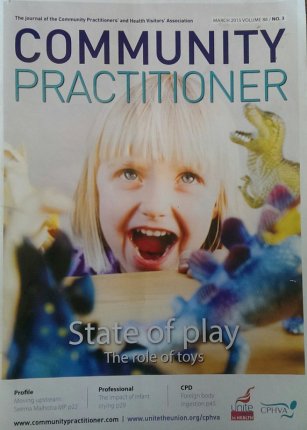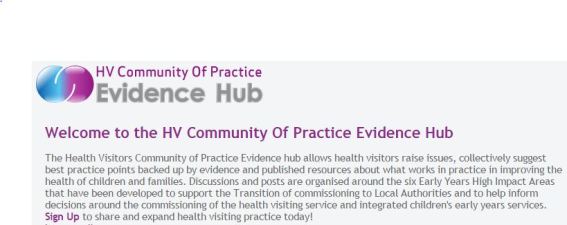If you have read my recent posts about quality of health visiting advice and encouraging parents to provide feedback, you will know that I am keen to address the current perception of health visiting that I see on social media. So many people, myself included, have had excellent health visitor support, but still there is a persistent theme on Facebook forums and on Twitter that HVs do not “know their stuff”. Considering how much training HVs do, I personally don’t believe that as many health visitors are as mystified about parenting topics as social media would have us believe. I feel there is a slightly different problem, and it is one of approach and goals rather than training.
When I met with David Munday of Unite before Christmas one thing that he said to me as part of our discussion really stuck with me. He said something along the lines of “Health Visitors want to enable children to be the best they can be and to enable parents to enjoy the experience of parenting. Health Visitors will try to focus on a family’s strengths. Health Visitors want to give children the best future and they want families to have the best possible experience.”
Now I’m paraphrasing there, but the meaning was clear: Health Visitors want us to be happy. They want us to enjoy parenthood, to enjoy our children, to have a pleasant experience as a family. Sounds pretty good doesn’t it?
Well it does, and then again it doesn’t. I was privileged to be able to explore this idea in an article for the March edition of Community Practitioner magazine, the journal of the Community Practitioners’ and Health Visitors’ Association.
My argument was that it had never occurred to me that my happiness or enjoyment of the parenting experience has anything to do with my Health Visitor, and a number of members of my Facebook group felt the same. As parents, we are expecting HVs to give us up to date, evidence based, accurate information on the health aspects of parenting, and this includes infant feeding, bedsharing, introducing solid food, post natal depression, toddler behaviour, weight gain and development. Yet if the focus is on keeping parents happy it goes a long way to explaining where things might be going wrong.
The classic example here is of the breastfeeding mum who is advised to give formula top ups. I say classic, because it happens all the time. Any breastfeeding peer supporter, counsellor or lactation consultant will tell you that formula top ups are rarely required. Either the mother has a problem with her milk supply which requires resolution, the child has a health problem which requires investigation or (far more likely) the pair simply require some breastfeeding support. So why do Health Visitors so often resort to recommending top ups? I don’t believe it is because they are behind in their breastfeeding training, I know they are all well trained and informed about infant feeding. I wonder though whether it isn’t because, in the short term at least, they believe introducing some formula will make mum and baby happy, will take the stress out of their lives and will make everyone’s life easier?
Unfortunately I am not convinced that this is the approach that families want, and in my article I shared a number of comments from parents to that effect.
“If Health Visitors are there to put mum’s happiness first, then they take on the role of friends, family and society which in turn will just perpetuate the beliefs and practices of that group, family or society…..They should be health professionals who provide accurate up to date information to help both babies and society to grow healthy.” (Julie, Yorkshire)
It is very easy nowadays for parents to discover that the advice they received from their health visitor was not the most up to date or the most evidence-based available. It doesn’t matter at that point what the intentions of the Health Visitor were, the parents lose faith in that professional. As an HV you may have made the decision to tell mum to try controlled crying because you could see that she was exhausted after nine months of broken sleep. But if you omitted to mention the body of evidence questioning that practice, or the evidence to suggest that sleeping through is not necessarily “normal” for a nine month old, please remember that she will find out that information for herself. And she will then wonder why you weren’t aware of it, and will hesitate to seek your advice again.
The Internet can be a minefield of dodgy information, but it is easy to find and follow trusted sites that spread from parent to parent via word of mouth and social media. If these sites are providing more evidence-based information than our health visitors, or are providing more in depth analysis of parents’ options, we start to see this situation where some parents lose faith in the health visiting profession. This is a huge problem, because health visitors play a vital role in supporting families, safeguarding public health and disseminating important messages. Parents encouraging each other to disregard HV advice is a big concern to me, yet it is hard to turn this tide if evidence based information is not the norm.
I would not wish to suggest that the profession becomes a robotic, information and signposting service – the personal touch is vitally important. The postnatal period is an extremely vulnerable time for mums, and many of us are eternally grateful for the emotional support and hand holding offered by our Health Visitors. And of course HVs have to use their discretion and judgement when it comes to the approach to take with families. But I feel it’s important to remember that all families prefer to make their own decisions. Some might need information in written form, some might be happy to be directed to the Internet, some may need a good chat through the options, others may require signposting to local groups and classes. But very few will be happy to discover that a health visitor has made the decision for them and given them only that piece of advice which they have decided is in the family’s best interests.
Barbara Potter of HV Community of Practice Evidence Hub read my original article and has been in touch with me to look at ways parents and health visitors can work together to tackle the issue of evidence-based practice.
The Hub can be followed on Twitter @HVeCOP and works in partnership with the Institute of Health Visiting, the University of Hertfordshire and The Open University. I have also been in touch with Elaine McInnes of the iHV who is keen to ensure that the resources available to parents on their site reflect current evidence and best practice. How many health visitors are engaged with these communities? How can we reach those who are not? How else is new evidence communicated to a busy workforce? As parents and health visitors, what are your favourite resources for information and advice?
As parents, we want to know that we will receive all of the information from our Health Visitor, and that it will be as accurate as possible. As professionals health visitors want what is best for families and children. We need to remember that they have the benefit of years of training, hard work and experience. They need to remember that, given the right information, we will know what is best for our family.


Unfortunately I think the author has entirely misunderstood what was said to her. Enjoying parenting is not the same as making someone happy. Health visitors are not there to put mum’s happiness first and whilst there needs to be diplomacy in advice given, it is given from a research base. I can only reiterate, helping a parent enjoy parenting is different to making someone happy. I can see this article is written with the very best intentions but it has missed the point and isn’t helpful to mum’s or HVs.
LikeLike
Thank you for your comment Annie. I am sorry that you feel the post is unhelpful. As you say, it was written with the best of intentions. Helen.
LikeLike
I love this article! As a mum of five (16, 15, 11, 7, & 2) I have had a lot of interaction with health visitors and their teams over that time. I have also volunteered alongside them for almost 12yrs as a breastfeeding peer supporter, I totally see where Helen is coming from.
I have often wondered what has led to some of the recommendations, and advice shared by Health Visitors, not just to myself, but to other mums right across the country too.
I have dealt with numerous mums being brought to tears, over the years, from HV visits & check ups. I know the HV teams are dedicated professionals who are trying to assist families. I know that most became HV because they care and wanted to reach out to families on a grass roots level. But there has always been something off, I just couldn’t put my finger on. And Helen, you’ve nailed it!
A HV who recommends Controlled crying, despite the staggering weight of evidence to show it being harmful, is just trying to offer solutions to a struggling mum. Or telling a mum her babies head is too big without explanation, or suggesting a breast milk substitute when challenges arise. I believe they are just trying to help here and now, but failing to recognise that mums want info and guidance, not decisions as to what advice is appropriate for them.
Mums I come in contact with want information, not approval. They can take it, and even if they choose to act contrary to this information. It’s THEIR choice.
So, please, any health visitors reading this, take note. You play an important role in new families, vulnerable parents are trusting you to be informed, up-to-date, compassionate, and supportive. You are there to help build the confidence that comes to parents making informed choices, not just for tonight, but for their lifetime.
Thank you Helen for a brave and direct look at where HV is, and where it should be.
cheers Angie xx
PS I do have faith that Health Visiting can be a positive experience, and having students like Jen are confirmation. This is her take as a student HV. https://jenthehv.wordpress.com/2015/06/05/what-health-visitors-do-the-basics/
LikeLike
Thank you for your support Angie. Helen.x
LikeLiked by 1 person